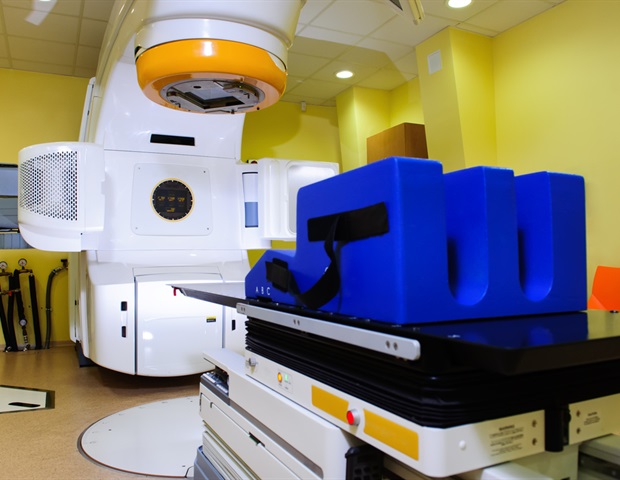Researchers at The College of Texas MD Anderson Most cancers Middle have found that lactate-producing intratumoral micro organism drive resistance to radiation remedy, suggesting that lactic acid-producing micro organism current in varied cancers could function novel therapeutic targets.
The research, printed at present in Most cancers Cell, reported {that a} specific bacterial species, Lactobacillus iners (L. iners), brought about most cancers cells to answer radiation by rewiring metabolic signaling pathways to withstand therapy. The researchers additionally discovered that L. iners was related to poorer scientific outcomes in sufferers with cervical most cancers.
These lactic acid-producing micro organism are seemingly liable for altering signaling pathways by priming most cancers cells to make use of lactate as an alternative of glucose to gas development and proliferation from oxidative stress following radiation remedy. That is probably paradigm shifting, and we presently are engaged on novel approaches to focus on these particular intratumoral micro organism. We’re hopeful that these efforts will lead us to approaches that may profit sufferers throughout a number of varieties of most cancers.”
Lauren Colbert, M.D., corresponding writer, assistant professor of Radiation Oncology
Cervical most cancers is a human papillomavirus (HPV)-related most cancers that originates in the identical approach and is comparable microscopically and genomically to anal and head and neck most cancers. A majority of these cancers are generally handled with completely different quantities of radiation. Cervical cancers usually reply properly to therapy, however some sufferers develop resistance, main Colbert and her colleagues to look at the function of the tumor microbiome in driving differential responses. Researchers used microbiome sequencing, focusing on bacterial cultures and in vitro fashions to review the tumor microbiome on this context.
Cervical most cancers presents a chance for simpler repeated tumor microbiome sampling, permitting the researchers to carry out large-scale sequencing analyses and focused tradition of tumor-resident micro organism from 101 sufferers with cervical most cancers present process chemoradiation between September 2015 and March 2022.
They found that L. iners was related to poor response to radiation and with decreased recurrence-free survival (RFS) and general survival (OS), even when accounting for recognized scientific threat components, intestine microbiome components and immune surroundings components within the tumor and in sufferers’ blood. This led the researchers to additionally carry out focused tradition of this particular micro organism from affected person samples.
L. iners is a part of a gaggle of fermenting micro organism that produce lactic acid as a metabolic finish product. On this research, the researchers discovered that cancer-derived L. iners inside tumors generate L-lactate, which most cancers cells use as an alternative of glucose to gas metabolic cycles and to fight oxidative stress that happens after radiation. Tumor lactate and lactate dehydrogenase (LDH) expression are already related to aggressive tumor development and poor survival throughout many most cancers varieties.
The researchers, co-led by Ann Klopp, M.D., Ph.D., professor of Radiation Oncology, have been in a position to induce therapy resistance by introducing lactate-producing L. iners to most cancers cells in vitro, ensuing within the rewiring of the tumor cell metabolism to make use of that elevated lactate.
The outcomes additionally revealed that L. iners have features within tumors that aren’t current in wholesome sufferers, suggesting that some modifications in these micro organism themselves could happen previous to most cancers improvement.
Whereas this research centered on L. iners, the researchers noticed a powerful affiliation between different tumor-associated lactic acid-producing micro organism and poor survival throughout a number of cancers, noting that 40% of species are related to RFS in subsets of lung, colorectal, pores and skin and head and neck cancers.
Colbert and colleagues presently are creating novel approaches to particularly goal these micro organism inside tumors, together with topical functions to ship anti-cancer medicine and enhance affected person outcomes for varied most cancers varieties.
This research was funded partly by MD Anderson, together with help from the HPV-Associated Cancers Moon Shot® and different inside grants, in addition to the Radiological Society of North America, the Nationwide Institutes of Well being/Nationwide Most cancers Institute (U54CA096300-19, P30CA16672), and the Most cancers Prevention and Analysis Institute of Texas (CPRIT) (RP180734).
Supply:
College of Texas M. D. Anderson Most cancers Middle
Journal reference:
Colbert, L. E., et al. (2023) Tumor-resident Lactobacillus iners confer chemoradiation resistance by means of lactate-induced metabolic rewiring. Most cancers Cell. doi.org/10.1016/j.ccell.2023.09.012.

